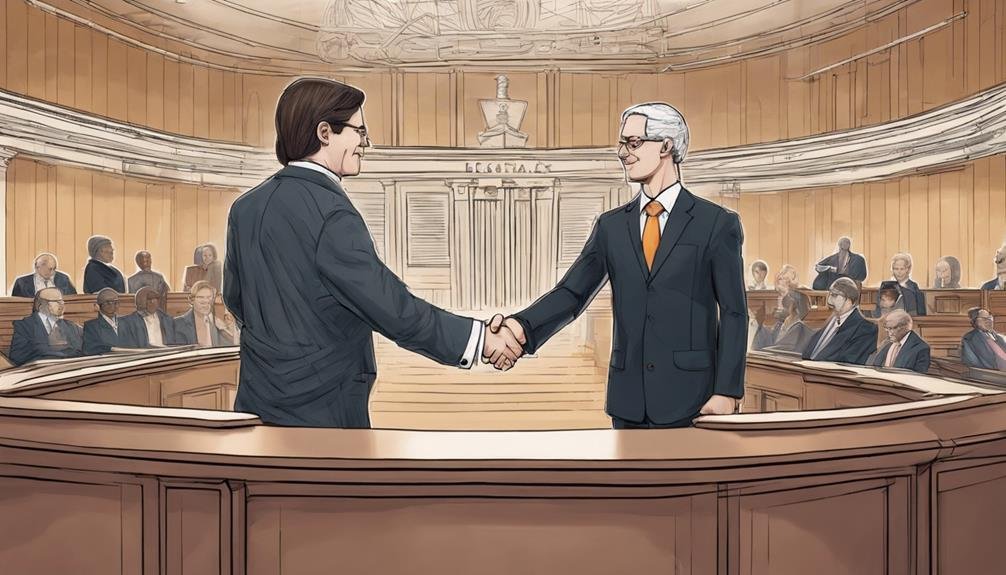Resolving blockchain disputes entails maneuvering global regulatory challenges due to the decentralized and immutable nature of the technology. Smart contracts automate transactions, posing legal uncertainties and the need for specialized expertise. Governance models like DAOs and consensus-based decision-making promote fair conflict resolution. Jurisdictional complexity arises from cross-border transactions, requiring a deep understanding of international law.
Enforcement mechanisms, including on-chain solutions and decentralized arbitration platforms, guarantee the transparent execution of resolutions. Building trust and efficiency in dispute resolution demands compliance with evolving regulatory frameworks. For a deeper understanding of blockchain disputes’ legal and regulatory insights, explore this complex landscape’s multifaceted aspects.
Table of Contents
Brief Overview of Resolving Blockchain Disputes: Legal and Regulatory Insights
- Understanding global regulatory challenges in blockchain disputes.
- Importance of compliance and legal frameworks in resolving disputes.
- Utilizing smart contracts for automated and transparent dispute resolution.
- Implementing governance models for efficient conflict resolution.
- Addressing jurisdictional complexities in cross-border blockchain disputes.
Regulatory Challenges in Blockchain Disputes
Regulatory challenges in resolving blockchain disputes arise primarily from the need for standardized laws governing this emerging technology across different global jurisdictions. The decentralized and immutable nature of blockchain, coupled with the use of smart contracts for automated transactions, adds complexity to dispute resolution processes. Legal uncertainty further complicates matters, as varying levels of regulatory clarity in different countries hinder the efficient resolution of blockchain disputes.
Arbitration, often used in traditional legal frameworks, faces challenges in adapting to the unique characteristics of blockchain technology. The evolving nature of blockchain technology introduces new technologies and functionalities that continuously challenge existing regulatory frameworks. Regulators worldwide are actively working to address these complexities and provide clear guidelines for resolving disputes in the blockchain space. Ensuring consistency and fairness in outcomes is paramount as the legal landscape adapts to accommodate the innovative capabilities of blockchain technology.
Legal Framework for Blockchain Disputes

The legal framework governing blockchain disputes poses significant challenges due to the decentralized nature of the technology and the global regulatory landscape’s need for uniformity. When disputes arise from smart contracts, traditional legal concepts may need help to adequately address the complexities introduced by blockchain technology and smart contracts.
This necessitates the development of specialized legal expertise to resolve smart contract disputes effectively. In blockchain technology and smart contracts, decentralized dispute resolution mechanisms are gaining traction as alternative dispute resolution systems. These systems aim to provide efficient and impartial ways to resolve smart contract disputes, considering blockchain transactions’ unique characteristics.
As regulations for blockchain disputes vary globally, maneuvering jurisdictional complexities requires a deep understanding of different regions’ legal and regulatory frameworks. Effective resolution of blockchain disputes hinges on a harmonious blend of legal knowledge and technological acumen to navigate the intricate landscape of blockchain dispute resolution.
Role of Smart Contracts in Dispute Resolution

In blockchain technology, smart contracts play a pivotal role in streamlining dispute resolution processes through their automated enforcement of agreements on the blockchain. These self-executing contracts operate based on predefined conditions written in code, eliminating the need for intermediaries and ensuring the automatic enforcement of contractual terms. By leveraging the decentralized nature of blockchain technology, smart contracts facilitate secure and transparent transactions, enhancing the efficiency of resolving disputes in this innovative space.
Smart contracts use a programming language to encode the terms of an agreement, enabling them to trigger actions when specific conditions are met. This capability not only expedites the resolution of disputes but also reduces the potential for human error or bias in the process. In online dispute resolution, smart contracts offer a reliable mechanism to swiftly and accurately resolve blockchain-related disputes, demonstrating technology’s transformative power in enhancing traditional legal practices.
Compliance Considerations in Blockchain Disputes

Traversing intricate regulatory frameworks is critical to addressing compliance considerations in blockchain disputes. When it comes to blockchain dispute resolution, understanding and adhering to legal requirements are paramount. Compliance measures are pivotal in mitigating risks and liabilities inherent in these disputes. Working through the complex web of regulatory frameworks demands a keen awareness of the legal landscape surrounding blockchain technology.
Regulatory insights provide valuable guidance in ensuring that all actions taken in resolving disputes align with the laws governing the use of blockchain. Expertise in legal and regulatory matters is essential for effectively tackling compliance challenges that may arise during blockchain dispute resolution. By staying abreast of the evolving regulatory environment and proactively implementing compliance strategies, parties involved in blockchain disputes can maneuver potential obstacles with greater confidence and clarity.
Governance Models for Blockchain Dispute Resolution

Various governance models, such as decentralized autonomous organizations (DAOs) and community-driven committees, are being explored to enhance blockchain dispute resolution processes. These models aim to promote transparency, efficiency, and decentralization in resolving disputes within the blockchain ecosystem. Consensus-based decision-making, arbitration versus mediation, and the enforcement of smart contracts are key focus points when discussing blockchain dispute resolution governance models.
Consensus-Based Decision-Making
Utilizing decentralized governance models, consensus-based decision-making plays a pivotal role in resolving disputes within blockchain ecosystems. Stakeholders are actively involved in decision-making processes, ensuring transparency and fairness. Blockchain platforms leverage consensus mechanisms such as proof of stake or proof of authority to address conflicts effectively.
These models aim to establish trust and legitimacy in resolving blockchain-related disputes by embracing decentralized governance. The emphasis on consensus-based decision-making fosters a collaborative approach where all parties have a say in the resolution process. This approach enhances the credibility of the dispute resolution mechanism and reinforces the integrity and reliability of blockchain ecosystems.
Arbitration Vs. Mediation
When considering governance models for resolving blockchain disputes, understanding the distinctions between arbitration and mediation is essential for stakeholders seeking effective conflict resolution mechanisms. Arbitration in blockchain disputes involves a neutral third party making a binding decision based on the evidence presented, offering a formal process with a final decision.
On the other hand, mediation in blockchain disputes entails a neutral third party facilitating communication and negotiation to reach a voluntary agreement, focusing on dialogue and mutually acceptable resolutions. Both arbitration and mediation serve as alternative dispute resolution methods for blockchain disputes, outside of traditional court litigation, within decentralized systems. These governance models are essential in establishing fair and efficient processes for resolving conflicts in blockchain environments.
Smart Contract Enforcement
Governance models for blockchain dispute resolution play a critical role in establishing the framework for enforcing smart contracts effectively within decentralized networks. Smart contracts, using blockchain technology, aim to automate contract execution but can lead to disputes arising from coding errors or misinterpretations. To address these challenges, developing new dispute resolution methods is essential.
Traditional courts may not be equipped to handle smart contract disputes efficiently, emphasizing the need for decentralized justice mechanisms. By incorporating on-chain voting systems, designated arbitration bodies, or decentralized autonomous organizations (DAOs), smart contract enforcement can be streamlined. Ensuring the integrity of smart contracts and blockchain transactions hinges on these governance models, which enable fair and efficient resolution of conflicts within decentralized networks.
Jurisdictional Issues in Blockchain Disputes

Jurisdictional complexities in blockchain disputes stem from the intricate interplay of global transactions and diverse legal frameworks. Disputes involving blockchain technology and smart contracts often transcend borders, leading to challenges in determining the appropriate jurisdiction for resolution. Conflicting laws across different jurisdictions can hinder the enforceability of dispute outcomes in cross-border transactions. Resolving jurisdictional issues requires a deep understanding of international law and the various dispute resolution mechanisms available.
In blockchain disputes, addressing jurisdictional issues is essential for ensuring fair and effective resolution. Legal frameworks play a significant role in tackling these challenges, providing guidelines and boundaries for resolving disputes that span multiple jurisdictions. Regulatory insights are crucial for understanding how jurisdictions approach blockchain disputes and developing strategies to mitigate jurisdictional conflicts. By considering the nuances of international law and the complexities of cross-border transactions, stakeholders can work towards overcoming jurisdictional hurdles and achieving successful outcomes in blockchain dispute resolution.
Enforcement of Blockchain Dispute Decisions

Addressing the enforcement of blockchain dispute decisions involves leveraging on-chain mechanisms and smart contracts to guarantee efficient and transparent execution of resolutions. Smart contracts play a pivotal role in automating the enforcement of dispute resolutions by executing predefined rules and conditions without the need for intermediaries.
Decentralized arbitration platforms like Kleros are at the forefront of facilitating the enforcement of blockchain dispute decisions, ensuring impartiality and efficiency in the resolution process. By utilizing on-chain mechanisms, blockchain technology enables transparent and swift execution of dispute resolutions within decentralized applications. Integrating oracles in smart contracts further enhances the reliability of enforcing blockchain dispute decisions by connecting real-world data to the digital domain.
Through these innovative approaches, traditional arbitration processes are being transformed, offering a more accessible and efficient means of resolving disputes in the evolving landscape of blockchain technology.
Frequently Asked Questions
What Is Blockchain Dispute Resolution?
Blockchain dispute resolution is settling conflicts in transactions or contracts recorded on a blockchain. It leverages blockchain technology, smart contracts, and decentralized governance, addressing legal frameworks, regulatory challenges, contract interpretation, and security vulnerabilities.
What Is the Main Source of Legal Uncertainty in Blockchain Technology?
Regulatory challenges, contract interpretation, liability concerns, jurisdictional conflicts, and enforcement mechanisms contribute to legal uncertainty in blockchain technology. The absence of legal precedents aggravates complexities, hindering stakeholders in resolving disputes effectively and efficiently.
What Are the Legal Issues With Blockchain Smart Contracts?
Legal issues with blockchain smart contracts encompass challenges in contract enforcement, regulatory compliance, liability risks, and jurisdiction concerns. Errors in smart contracts, interpretation discrepancies, validity doubts, performance issues, and dispute resolution complexities further compound these legal complexities.
How Do You Resolve Disputes in Smart Contracts?
Utilizing the arbitration process proves invaluable in maneuvering the complexities of smart contract disputes. Addressing issues like code interpretation, contract breaches, and compensation claims, arbitration with third-party involvement guarantees efficient resolution and upholds legal implications within blockchain technology.
Conclusion
To sum up, blockchain disputes present unique regulatory, legal, and jurisdictional challenges. One interesting statistic to contemplate is that according to a report by Deloitte, blockchain disputes are expected to increase as the technology becomes more widespread, highlighting the importance of developing robust governance models and compliance frameworks for effective resolution.
As blockchain technology grows, stakeholders must proactively address these complexities to guarantee fair and efficient dispute resolution processes.




